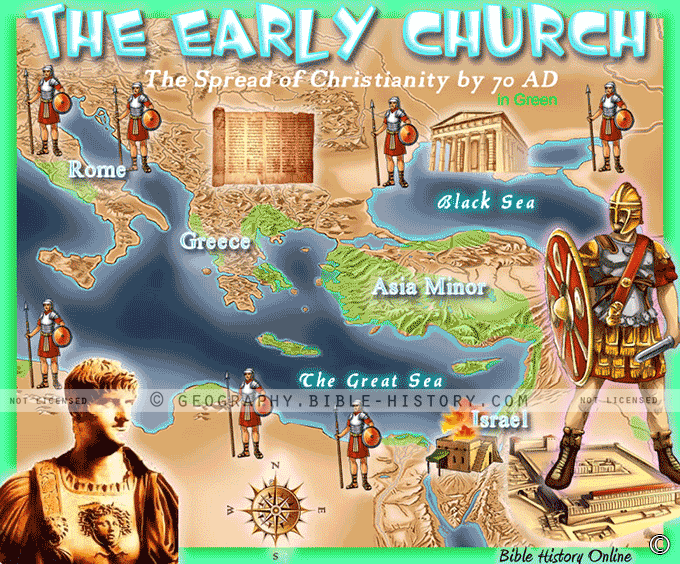
The Early Church, a foundational period following the life of Jesus Christ, marks a pivotal chapter in the story of Christianity. From its modest beginnings in the wake of Christ's resurrection, the Early Church evolved into a movement that would profoundly shape the course of human history, spirituality, and religious practice.
Post-Resurrection Beginnings
The Early Church emerged in the aftermath of Jesus' resurrection and ascension. His disciples, emboldened by the Holy Spirit, carried forward His teachings and the message of salvation. This period witnessed the outpouring of the Holy Spirit on Pentecost, igniting a fervor for sharing the Gospel.
Community and Fellowship
One of the defining characteristics of the Early Church was its strong sense of community and fellowship. Believers gathered for worship, shared resources, and supported one another. Acts of compassion and generosity were integral to their way of life.
Spread of the Gospel
Despite challenges and persecutions, the Gospel message spread far beyond its origins in Jerusalem. The journeys of apostles like Paul and Peter contributed to the establishment of Christian communities throughout the Roman Empire and beyond.
Doctrinal Development
The Early Church also grappled with theological questions and challenges. Discussions about the nature of Jesus, His divinity, and His role in salvation led to the formulation of core Christian doctrines, such as the Nicene Creed.
Persecution and Martyrdom
Believers in the Early Church faced persecution for their faith. Roman authorities viewed Christianity as a threat to the established order. Many Christians endured hardships and martyrdom, serving as a testament to their unwavering commitment.
Institutionalization and Transformation
As Christianity gained prominence, it transitioned from an informal movement to a more organized institution. This period also witnessed the construction of churches and the establishment of leadership roles within the Church.
Legacy and Influence
The Early Church's legacy is profound and enduring. Its teachings, writings, and theological discussions laid the foundation for Christian thought and practice. The growth of monasticism, theological debates, and the emergence of distinct Christian traditions all trace their origins to this period.
Continuity and Change
The Early Church was a time of continuity with Judaism, as well as a period of transformative change. The transition from a small group of disciples to a global movement highlights the enduring power of faith and the transformative impact of Christ's message.
The Early Church stands as a bridge between the life of Jesus Christ and the expansive history of Christianity. Its community-focused approach, theological explorations, and enduring faithfulness set a precedent for believers across generations. As we delve into the narratives of the Early Church, we uncover the roots of our faith and the profound impact of those who carried the torch of Christ's teachings into the world.
Blank Topo Map of The World
Abraham’s Journey
The Captivity of Judah (586-516 B.C.)
The Fall of Judah 586 B.C.
The Northern Kingdom of Israel
The Southern Kingdom of Judah
The Divided Kingdom
The Fertile Crescent
Ur of the Chaldees
Shechem in Old Testament Times
Prophets, Kings, and Nations
Jesus Last Passover
New Testament Israel
New Testament Places
Old Testament Israel
Provinces of the Roman Empire
Israel during David’s Kingdom
David’s Kingdom
Cities of the New Testament 4
Cities of the New Testament 3
Cities of the New Testament 2
Mediterranean Sea
Cities of the New Testament
First Century Jerusalem
Empire of David and Solomon
David’s Kingdom
Israel Under Rehoboam
Ophir and Tarshish
The Period of the Kings
Ramoth Gilead
Samaria
Solomon’s Temple
Zarephath and MT Carmel
Jabesh Gilead and Tribes
Judah in the Time of David
Kingdom of Saul
Kirjath Jearim
Michmash
Mount Gilboa in the Time of David
Nob Davids Flight
Shiloh
Israel and Judah
Assyrian Empire Under Esarhaddon
Assyrian Empire Under Sennacherib
Captivity of 10 Tribes
Events in 2 Kings
The Khabur River
Israel and Syria
Captives From Judah
Kingdom of Jeroboam
Mesha’s Kingdom
Pharaoh Necho Battles King Josiah at Megiddo
Babylonian, Mede and Persian Empires
Samaria and Nearby Territories
Syria at its Height
Hebron
Mahanaim
1949 Map of Israel With Boundaries
First & Second Journeys of Paul
Journeys of the Apostles
Paul’s Third Missionary Journey
Saul’s Journey to Damascus and Arabia
Paul’s Final Visits
Paul’s 1st Missionary Journey
Paul’s 2nd Missionary Journey
Paul’s 3rd Missionary Journey
Paul’s Voyage to Rome
Phillip Journeys to Samaria and Gaza
Judah at the Time of Amos
Empire of Alexander the Great
Israel Under the Maccabees
Galilee During Maccabees
Idumea Intertestamental Period
Kingdom of the Ptolemies
Kingdom of the Seleucids
Ptolemaic Egypt Seleucid Asia
The Roman World
Kingdom of Ptolemies and Seleucids
The World During the 6TH Century BC
Mount Horeb
The Red Sea
The Exodus
Ezra’s Journey to Restore Jerusalem
Israel and Judah During Hosea’s Time
The Ancient World
Canaan During the Time of Abraham
The City of Shechem
Supposed Location of the Garden of Eden
The Land of Israel in Genesis
The Jordan River
The Kingdom of Nimrod
Mount Ararat and Mesopotamia
The Descendants
Sodom and Gomorrah
The Kingdom of Egypt
The Hamites
The Kingdom of the Hittites
Ur of the Chaldees
Judah at the Time of Haggai
Jesus Passes Through Samaria
